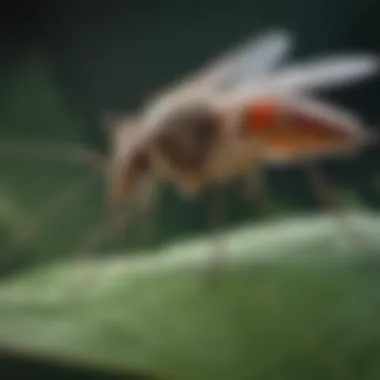Arrow Exterminators: Advanced Mosquito Control Techniques


Intro
Mosquitoes are more than just a nuisance in warmer months; they are carriers of diseases that can affect both humans and pets. Understanding these pests is the first step to effectively managing them. Arrow Exterminators has developed mosquito control strategies that are not only efficient but also align with eco-friendly practices.
In this article, we will delve into the biology of mosquitoes, explore preventative measures, and discuss various control methods that can help maintain a pest-free environment.
Understanding the Pest
Mosquito control begins with understanding the pest. This section will highlight how to identify mosquitoes and detail their life cycle.
Identification
Identifying mosquitoes is crucial in any pest management strategy. There are approximately 3,500 species globally, but only a few pose a threat to human health. Adult mosquitoes can be recognized by their slender bodies, long legs, and distinct proboscis, appearing different from other insects.
Some common species include:
- Aedes aegypti - known for transmitting dengue fever and Zika virus.
- Anopheles quadrimaculatus - a primary vector of malaria.
- Culex pipiens - responsible for West Nile virus transmission.
Knowing which species are prevalent in your area can guide pest control efforts effectively.
Life Cycle
The life cycle of a mosquito consists of four stages: egg, larva, pupa, and adult. Each stage plays a vital role in their population dynamics.
- Eggs are laid in water, often in stagnant conditions.
- Larvae emerge from the eggs and live in water, feeding on organic material.
- Pupae develop after the larval stage, remaining in the water and undergoing metamorphosis.
- Adults emerge to continue the cycle, often seeking blood meals necessary for female reproduction.
Understanding these stages assists homeowners in determining the best times and methods for intervention.
Pest Prevention Strategies
Preventive measures are essential for keeping mosquito populations under control. Here we will discuss effective strategies, including environment modification and physical barriers.
Environment Modification
Modifying the environment can significantly reduce mosquito breeding sites. Homeowners should:
- Eliminate standing water around the property, including in planters, bird baths, and gutters.
- Maintain swimming pools and ensure they are treated regularly.
- Keep lawns and gardens trimmed to reduce resting sites.
These changes not only decrease mosquito populations but also contribute to a healthier garden. Making these alterations requires ongoing efforts, especially after heavy rainfall.
Physical Barriers
In addition to environmental efforts, creating physical barriers can offer immediate relief from mosquito bites. Use of items such as:
- Screens on windows and doors to prevent mosquitoes from entering homes.
- Netting around patios and porches can provide outdoor protection.
- Mosquito traps can capture mosquitoes before they reach living spaces.
These barriers can be simple to implement and can significantly improve comfort for family and guests.
Control Methods
When prevention is no longer enough, control methods become necessary. This section discusses the two main approaches: chemical and biological control.
Chemical Control
Chemical control methods often include insecticides that target adult mosquitoes or their larvae. Homeowners may consider:
- Pyrethroids - commonly used to kill adult mosquitoes. They are effective but should be applied with caution, considering environmental impacts.
- Larvicides - target mosquito larvae in water and prevent their growth into adult mosquitoes.
While effective, chemical solutions should be used judiciously, taking into account their potential effects on beneficial insects and the surrounding ecosystem.
Biological Control
Biological control relies on natural predators and biological agents to manage mosquito populations. Methods include:
- Introducing fish, such as guppies, in ponds that eat mosquito larvae.
- Bacteria like Bacillus thuringiensis israelensis (Bti), which selectively targets mosquito larvae without harming other wildlife.
These methods emphasize environmentally-friendly practices while effectively controlling mosquito populations.


"Effective mosquito control is not just about eradication; it is about managing populations sustainably."
Conclusively, Arrow Exterminators advocates for a well-rounded approach to mosquito control that emphasizes understanding, prevention, and responsible management practices. This detailed exploration of mosquito biology, prevention strategies, and control methods offers homeowners the knowledge necessary to maintain a pest-free home while considering ecological impacts.
Foreword to Arrow Exterminators
Understanding the significant role of Arrow Exterminators in the mosquito control landscape offers valuable insights for homeowners seeking efficient pest management solutions. Arrow Exterminators is known for its comprehensive treatment options that address the growing nuisance of mosquitoes. Mosquitoes are not only a discomfort; they pose health risks through the transmission of diseases. Thus, proper control is critical. Arrow’s methods, rooted in both science and practical application, emphasize the need for sustainable approaches that consider environmental impact while effectively reducing mosquito populations.
Overview of Services Offered
Arrow Exterminators provides a range of services tailored to combat mosquito infestations. Their offerings include:
- Mosquito Control Plans: Customized strategies designed for individual properties, assessing specific needs and conditions.
- Insecticide Treatments: Use of FDA-approved products that specifically target mosquitoes, applied strategically around the home.
- Fogging Services: A method that disperses insecticides in fine droplets over a large area, effective for immediate relief during high mosquito activity.
- Ongoing Monitoring: Regular checks to assess mosquito activity and the effectiveness of treatment plans add a proactive layer to pest management.
By leveraging these services, Arrow Exterminators helps homeowners create a more enjoyable and safe living environment.
Company History and Reputation
Founded decades ago, Arrow Exterminators has built a solid reputation on quality and reliable pest control. The company focuses on customer service and community involvement, two elements that enhance its credibility. Many homeowners trust Arrow to deliver results.
Over time, Arrow Exterminators has evolved its approaches, integrating the latest research into pest management. It has also sought out eco-friendly options, aligning with the increasing public demand for sustainable practices. The company has been recognized in various industry awards for its commitment to innovation and effectiveness. Homeowners can feel assured that they are choosing a company with proven expertise in dealing with mosquitoes and other pests.
Understanding Mosquitoes
Understanding mosquitoes is critical to developing effective control strategies. This section explains their biology, behavior, and life cycle, offering insight into how Arrow Exterminators can best address mosquito infestations in residential areas.
Biology and Life Cycle
Mosquitoes belong to the family Culicidae and are divided into various genera. The most common types include Aedes, Anopheles, and Culex. Each species has specific traits and characteristics impacting control methods.
A mosquito's life cycle consists of four stages: egg, larva, pupa, and adult. Understanding these stages aids in identifying when and where control measures should be applied. Female mosquitoes require blood to develop their eggs, leading them to seek out hosts.
Life Cycle Stages:
- Egg: Laid in stagnant water. They may survive dry conditions for a period.
- Larva: Also known as wrigglers, they feed on organic matter in the water.
- Pupa: Known as tumblers, pupae are non-feeding and prepare for the adult stage.
- Adult: Emerges from the pupa and begins the cycle anew.
"Understanding the life cycle allows for targeted control strategies which can significantly reduce mosquito populations."
Habitat and Behavior Patterns
Mosquito habitat preferences impact their population dynamics. They typically breed in stagnant water, including ponds, birdbaths, and clogged gutters. Adult mosquitoes are most active during dawn and dusk when they seek blood meals. This behavior pattern can influence when control strategies should be executed.
Key Habitat Factors:
- Access to standing water for breeding.
- Vegetation that provides shelter and resting sites.
Additionally, temperature and humidity play vital roles in mosquito behavior. Warmer, humid conditions favor higher mosquito activity and reproduction rates. By understanding these elements, homeowners can take proactive steps to manage their environments and reduce mosquito populations.
Effective mosquito control relies not only on intervention methods but also on the understanding of these insects. This knowledge enables homeowners to recognize breeding sites and make informed decisions on prevention efforts.
Mosquito Control Techniques
Mosquito control techniques are essential for managing populations of these pests effectively. They directly impact the comfort and health of homeowners. Understanding the various approaches can help inform decisions on which strategies to employ in different settings. Each method has its own advantages and potential drawbacks, making it crucial to evaluate options carefully. The objective is to create a balanced approach that minimizes chemical use while maximizing effectiveness.
Insecticide Application Methods
Insecticides are a common tool in mosquito control. Arrow Exterminators uses a variety of application techniques to target mosquito populations. These include residual spraying, fogging, and targeted baiting. Each method has unique benefits.
- Residual Spraying: Creates a barrier on surfaces where mosquitoes rest. This can be an effective long-term solution if applied correctly. It is crucial to choose the right formulation for specific environments, as not all insecticides are suitable for every situation.
- Fogging: Often used for immediate relief, fogging disperses insecticides in a mist form. This technique can rapidly reduce mosquito numbers in large open areas, making it ideal for outdoor events.
- Targeted Baiting: This method uses mosquito attractants combined with insecticides. The aim is to lure mosquitoes to specific locations for effective elimination. While this might take more time compared to spraying, it has a lower environmental impact.
Through assessing these methods, Arrow Exterminators tailors their approach based on the specific needs of their clients. This customization ensures that the most effective solutions are utilized.
Biological Control Agents
Biological control agents are another layer of defense in mosquito management. This method hinges on the use of natural predators or pathogens to manage mosquito populations.
- Predatory Insects: Dragonflies and certain beetles feed on mosquito larvae. Encouraging these insects in local ecosystems can naturally reduce mosquito numbers.
- Bacterial Agents: Products like Bacillus thuringiensis israelensis (Bti) effectively target mosquito larvae without harming other wildlife. They provide a targeted approach that minimizes broader ecological impact.


Integrating biological control agents with traditional methods enhances overall effectiveness. Homeowners are encouraged to understand these methods and consider them as part of their pest management strategies. Utilizing fewer chemicals can lead to a healthier home and environment.
Trapping and Surveillance Techniques
Trapping and surveillance play a vital role in understanding mosquito behavior and population dynamics.
- Mosquito Traps: Various traps attract mosquitoes using carbon dioxide and other lures. By monitoring the number of captured mosquitoes, technicians can gauge local populations and detect peaks in activity.
- Surveillance Programs: Arrow Exterminators utilizes data collection programs to track mosquito life cycles and breeding sites. By observing when and where mosquito populations surge, the company tailors treatments accordingly. This proactive approach helps manage infestations before they become unmanageable.
By employing these techniques, Arrow Exterminators not only addresses current issues but also looks to foresee potential challenges. Knowledge is power in the battle against mosquitoes, and these strategies empower homeowners to take informed action.
"Understanding the techniques of mosquito control allows homeowners to protect their families effectively. The selection of the right methods is crucial for success in managing these pests effectively."
In summary, understanding mosquito control techniques equips homeowners with the insights needed to manage pest pressures in their environments. Combining insecticides, biological agents, and proactive surveillance creates a comprehensive framework for effective mosquito management.
Preventive Measures for Homeowners
Preventive measures for homeowners play a critical role in effectively managing mosquito populations. These strategies not only help in reducing mosquito presence but also minimize the risk of diseases transmitted by these pests. Homeowners can implement several actions to create safer living spaces and limit mosquito breeding around their properties.
Eliminating Breeding Sites
One of the primary preventive measures involves eliminating potential breeding sites. Mosquitoes are drawn to standing water, where they lay eggs. Common locations include clogged gutters, bird baths, ponds, and even small containers like flower pots. To significantly decrease mosquito populations, homeowners should:
- Regularly clear gutters and downspouts to prevent water build-up.
- Change water in bird baths at least once a week.
- Empty and clean any containers that may collect water, such as buckets and pet dishes, weekly.
- Fill in or drain puddles or depressions in the yard that accumulate water.
By addressing these breeding grounds, homeowners can disrupt the mosquito life cycle and reduce the number of mosquitoes in and around their homes.
Implementing Landscaping Strategies
Another effective way to combat mosquitoes is through thoughtful landscaping. Certain plants can repel mosquitoes, it’s beneficial to choose plants that deter these pests. Homeowners may consider planting:
- Lavender
- Marigold
- Citronella grass
- Rosemary
In addition to selecting appropriate plants, proper yard maintenance is also crucial. Keeping grass and bushes trimmed eliminates shady areas where mosquitoes like to rest. When creating paths, consider using gravel or stone, as these materials allow for better drainage, reducing standing water chances. It’s also wise to design natural barriers away from play areas and patios.
"A well-maintained yard not only enhances aesthetic appeal but also significantly lowers mosquito habitats."
By implementing these preventive measures, homeowners can play an active role in managing mosquito populations. This approach not only creates a more enjoyable environment for outdoor activities but also contributes to the overall health and safety of the community.
The Role of Eco-Friendly Practices
In the context of mosquito control strategies, the role of eco-friendly practices cannot be overstated. With growing concerns about environmental health and sustainability, it’s crucial to consider methods that minimize harm to ecosystems while effectively managing pest populations. Eco-friendly approaches in mosquito control align with the philosophy of maintaining a balanced ecosystem. This aspect is particularly relevant for homeowners who seek to safeguard their families from mosquito-borne diseases without compromising the environment.
Utilizing eco-friendly practices offers multiple benefits. These methods often employ natural ingredients and non-toxic materials, reducing the risk of chemical exposure for humans and pets. Moreover, many of these practices encourage biodiversity, which can help in controlling mosquito populations sustainably over time. It is also essential to consider community health; eco-friendly practices can lead to reduced pesticide use and its subsequent runoff, which benefits local waterways and wildlife.
Sustainable Pest Management Solutions
Sustainable pest management solutions are at the heart of effective mosquito control. Arrow Exterminators incorporates these solutions to promote long-term results. Biological control agents, such as predators like dragonflies and certain fish species, can help manage mosquito larvae in water bodies. By enhancing these natural habitats, the need for chemical treatments is significantly reduced.
Households can also engage in practices such as using essential oils, like citronella and eucalyptus, as natural repellents. These oils can deter mosquitoes without adverse effects on the surrounding environment.
In addition to biological methods, environmental management plays a pivotal role. Homeowners should ensure proper drainage and eliminate standing water, which serves as breeding grounds for mosquitoes. Regular maintenance of gutters, birdbaths, and flower pots can make a noticeable impact.
Community Involvement and Education
Community involvement and education are instrumental in fostering an effective eco-friendly mosquito control system. Arrow Exterminators advocates for local communities to engage in collective efforts. This can include community clean-up events where residents join forces to eliminate standing water and educate others about the habits of mosquitoes. Public information campaigns can further enhance awareness and promote participation in habitat management strategies.
Education serves as a vital tool. When homeowners understand the implications of mosquito habitats and the available eco-friendly solutions, they are more likely to take the necessary precautions. Families can hold educational workshops or collaborate with local pest control experts to disseminate practical knowledge on sustainable practices.
"Community action can significantly reduce mosquito populations while promoting a healthier ecosystem."
Technology in Mosquito Control
Technology plays a crucial role in the fight against mosquitoes. Arrow Exterminators integrates advanced techniques and tools to enhance effectiveness in its mosquito control strategies. By employing modern technology, the company can efficiently target mosquito populations while minimizing environmental impact. As homeowners seek a balance between pest control and sustainability, the use of technology becomes more relevant than ever. Here are key aspects to consider:
- Efficiency: Technology allows for quicker and more precise identification of mosquito hotspots. This leads to faster action and potentially reduces infestations.
- Targeted Treatments: Advanced systems can deliver pesticides specifically where needed, avoiding unnecessary chemical use.
- Real-time Monitoring: Technology facilitates continuous observation of mosquito activity. This helps in adjusting methods and strategies as needed, ensuring plans remain effective.
Innovations in Pest Control Technology


Recent innovations in pest control technology have transformed how Arrow Exterminators addresses mosquito issues. Notable advancements include:
- Smart Traps: These traps use sensors to detect mosquito presence. They send alerts when mosquito levels reach critical thresholds. This ensures timely intervention.
- Drone Technology: Drones equipped with spraying capabilities can efficiently cover large areas. This method can reach hard-to-access locations, reducing labor intensity.
- Biopesticides Development: Technologies focusing on biopesticides aim to use natural organisms for mosquito control. By enhancing the effectiveness of these bio-based solutions, Arrow Exterminators furthers eco-friendly practices.
Incorporating these innovations allows for more effective mosquito management and shows a commitment to using cutting-edge solutions in pest control.
Role of Data Analytics and Monitoring
Data analytics serves as a backbone in Arrow Exterminators' mosquito control strategy. By harnessing the power of data, the company can make informed decisions about its services. The importance of this approach includes:
- Predictive Analysis: By analyzing historical data, predictions can be made about mosquito activity in different seasons or environments. This allows for planning and resource allocation effectively.
- Customer Insights: Collecting data from client interactions helps customize services. Specific needs of homeowners can be addressed through tailored strategies based on insights gained from previous cases.
- Performance Tracking: Continuous monitoring of treatment effectiveness enables Arrow Exterminators to refine its methods. Any necessary adjustments can be made in real-time to optimize control measures.
By utilizing data analytics, Arrow Exterminators not only improves its pest control strategies but also enhances customer satisfaction.
Consultation and Professional Services
Consultation and professional services are crucial components in effective mosquito control. They provide homeowners with specialized knowledge and tools necessary for addressing mosquito infestations comprehensively. Understanding when to seek these services is vital for maintaining a pest-free environment. A professional approach goes beyond simple treatments; it involves thorough assessments and tailored strategies. Proper consultation ensures that methods employed are not only effective but also safe for residents and the ecosystem.
When to Seek Professional Help
Recognizing the right time to seek professional help can make a significant difference. Here are some key indicators:
- Visible Mosquito Population: If you notice a substantial increase in mosquito activity around your home, it may be time to call for expert assistance.
- Recurrent Problems: Persisting issues despite DIY solutions can indicate that a more sophisticated approach is necessary.
- Health Concerns: If individuals in your household are experiencing allergic reactions or health issues related to mosquito bites, immediate professional consultation is suggested.
- Environmental Concerns: If you use pesticides at home but are concerned about their ecological impact, professionals can offer eco-friendly solutions tailored to your needs.
Professional exterminators from Arrow Exterminators can assess your property, identify breeding sites, and develop an effective strategy to minimize mosquito populations.
What to Expect from Arrow Exterminators
Engaging Arrow Exterminators for mosquito control services involves a structured process:
- Initial Consultation: During the first visit, experts will conduct a thorough inspection to understand the scope and nature of the infestation.
- Assessment of Risks: They will evaluate potential health risks associated with mosquito presence, providing insights on how to protect your family.
- Customized Action Plan: Arrow Exterminators will develop a targeted strategy that addresses specific threats in your environment, offering tailored solutions.
- Implementation: This stage includes the actual treatment processes, which may involve both chemical and non-chemical methods, ensuring safety and effectiveness.
- Ongoing Monitoring: After treatment, Arrow Exterminators offer continued support, monitoring the situation and adjusting strategies as needed to maintain pest-free conditions.
Effective mosquito control requires more than just a quick fix; it demands strategic planning and professional insight.
This thorough approach by Arrow Exterminators ensures that you receive quality service that aligns with your environmental values while effectively reducing the mosquito population around your home.
Personal Testimonials and Case Studies
Understanding the impact of mosquito control strategies is crucial for homeowners. Personal testimonials and case studies serve as effective tools to articulate real-world experiences. They offer perspectives that go beyond theoretical methods. Such insights can help potential clients understand what to expect from Arrow Exterminators’ services.
Success Stories
Success stories highlight the effectiveness of mosquito control methods through personal accounts. For example, one homeowner in Florida reported a drastic reduction in mosquito occurrences after implementing Arrow Exterminators’ treatment. This family had struggled with infestations for years. After continuous applications and consultation, they experienced a peaceful outdoor environment as their backyard became a safe space for their children and pets.
Another case involved a community center that faced persistent mosquito problems during summer events. After partnering with Arrow Exterminators, the center noted a significant drop in complaints regarding mosquito bites. The center manager emphasized the professionalism of the team and their tailored approach to the specific challenges faced. Such anecdotes reinforce the effectiveness of targeted treatments and community-oriented service.
Lessons Learned from Mosquito Control
From these stories, several lessons emerge which can inform future homeowners looking for effective strategies. First, it is essential to recognize that every property is unique. Customizing mosquito control efforts based on specific needs leads to better outcomes. Secondly, proactive measures and continuous monitoring play critical roles in effective management. Homeowners learned to be vigilant, ensuring any standing water was removed promptly, thus enabling the treatments to work effectively.
Lastly, communication between homeowners and pest management professionals is key. Success depends not only on the techniques applied but also on the relationship built. Homeowners who engaged actively found improved results. This collaborative approach illustrates that mosquito management is not just a service but also a partnership.
"Working closely with Arrow Exterminators transformed my garden into a mosquito-free haven. Their expertise made all the difference." - Satisfied Client
The value of personal testimonials and case studies cannot be overstated. They provide tangible examples and insights that empower homeowners in their efforts to combat mosquito issues.
Closure
In reviewing Arrow Exterminators' mosquito control strategies, it becomes clear that these approaches are integral to managing the mosquito population effectively. Understanding the complexities of mosquito behavior, deployment of specific techniques, and emphasis on eco-friendliness shapes the core of effective pest management. This article sheds light on various aspects, providing a comprehensive look at how to maintain pest-free environments for homeowners while being sensitive to ecological impact.
Recap of Key Points
The key points presented throughout this article include:
- Understanding Mosquito Biology: Recognizing the biology and lifecycle of mosquitoes is crucial for deciding on effective control measures. This knowledge aids in timing and method selection.
- Control Techniques: Various methods such as chemical applications, biological agents, and physical traps have been discussed. Each method presents unique advantages and limitations depending on the environment.
- Preventive Measures: Homeowners can proactively reduce mosquito populations by eliminating standing water and implementing smart landscaping strategies.
- Eco-Friendly Practices: Emphasizing sustainable approaches in pest control not only benefits the environment but also promotes community education and involvement.
Future Trends in Mosquito Control
Looking ahead, mosquito control strategies are expected to evolve significantly. Key trends shaping the future of this field include:
- Advanced Technology: The integration of smart technology in pest management, including automated monitoring systems and drones, is on the rise.
- Data Analytics: Utilizing data to inform mosquito activity predictions will enhance targeting and efficiency of control measures.
- Biological Innovations: Ongoing research in biological control methods, such as genetically modified mosquitoes, indicates potential in reducing populations sustainably.
In summary, the field of mosquito control is dynamic. As science and technology advance, there will be increasing opportunities to develop more effective and environmentally responsible approaches.







